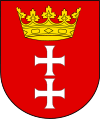Kokoszki
Kokoszki (German: Kokoschken; Kashubian: Kòkòszczi) is one of the neighbourhoods of the city of Gdańsk, Poland. During the Second World War Kokoschken was a location of two German concentration camps: Danzig-Burggraben and Kokoschken, which were SS sub-camps (Außenlager) of the Stutthof concentration camp located 34 kilometres (21 mi) east of Danzig (Gdańsk).
Camp Danzig-Kokoschken operated from September 13, 1944 with prisoners from Poland, France, Netherlands, Lithuania, Latvia, Germany and Hungary, mostly of Jewish origin. The first transport brought about 500 women. Within several weeks the number grew to 1,600. In the winter of 1945 the Poles imprisoned by the Gestapo office in Danzig were sent in. The prisoners were kept in barracks from where they were transported every day by train to the Schichau-Werke shipyard, to work two 12-hour shifts building submarines and anti-raid shelters.[1] The prisoners received rations of half-a-litre of watery soup and 250 grams of bread per day; not enough to sustain their ability to work. There was no proper clothes in winter. People died in great numbers as a result of epidemics, workplace accidents, and beatings by the guards. Archival material indicate that such treatment was common already at the end of 1944. Dead bodies were burned in a crematorium but also buried in mass graves at the cemetery in Saspe (Zaspa).[1]
See also
- Poland bus disaster of 1994 involving a PKS commuter bus
| Wikimedia Commons has media related to Kokoszki (Gdańsk). |
References
- J. Więsyk (2015). "Gdańsk-Kokoszki - KL Stutthof Sub Camp". Virtual Shtetl. POLIN Museum of the History of Polish Jews. Archived from the original on 2 April 2015. Retrieved 10 March 2015.
